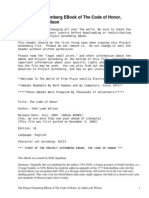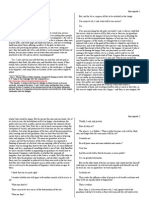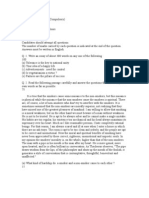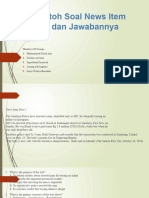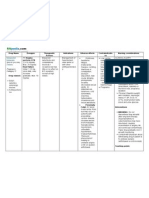S5 General Paper End of Term 1-1
S5 General Paper End of Term 1-1
Uploaded by
collinenyanzi3Copyright:
Available Formats
S5 General Paper End of Term 1-1
S5 General Paper End of Term 1-1
Uploaded by
collinenyanzi3Original Title
Copyright
Available Formats
Share this document
Did you find this document useful?
Is this content inappropriate?
Copyright:
Available Formats
S5 General Paper End of Term 1-1
S5 General Paper End of Term 1-1
Uploaded by
collinenyanzi3Copyright:
Available Formats
S101 / 1
GENERAL PAPER
PAPER 1
2 hrs 40 min
MAJET SECONDARY SCHOOL – KYEBANDO
END OF TERM 1 EXAMINATION
S.5 GENERAL PAPER
TIME: 2 HOURS 40MINUTES
Instructions:
The total time of 2 Hours and 40 Minutes includes ten minutes to study the questions before you
begin your answers.
Answer only two questions which must be chosen as follows: one question from section A and one
question section B
Answers to each question must begin in a fresh answer booklet which should then be fastened
together.
You are advised to divide your time equally between the two questions.
All questions carry equal marks.
Turn over
© RESERVED BY MAJET EXAMINATION’S BOARD 2017 Page 1
SECTION A
Answer one question from this section
1. Examine the values of forests to Uganda and the causes of deforestation
2. What impact have fashions created on the Ugandan society today?
3. Discuss the various ways of preserving African Culture.
4. Account for the negative attitude towards taxation in Uganda. How can this attitude be changed?
5. „Money is the root cause of evil‟. Discuss.
6. To what extent has industrialization contributed to environmental degradation in Uganda?
SECTION B
Answer one question from this section.
7. Study the table below showing the estimated magnitude of HIV and AIDS by age and gender in
Uganda (1993 and 1998) and answer the questions that follow:
ESTIMATED MAGNITUDE OF HIV/AIDS IN UGANDA.
Age/Gender 1993 1998
0 – 14 years (both sexes) 153,000 280,780
15 – 19 years (both sexes) 137,480 168,590
20 – 49 years Females 626,780 776,590
Males 581,620 721,000
50 years + (both sexes) 182,100 225,035
Adapted: Uganda National Operational Plan for HIV / AIDS / STD Prevention,
Care and Support (1994-1998).
Questions:
(a) Calculate the:
(i) Percentage increase for each age group of people living with HIV/AIDS.
(ii) Overall percentage increase in HIV/AIDS infection between 1993 and 1998.
(b) (i) Which age group has the highest percentage increase in HIV/AIDS infection?
(ii) What is the likely impact of such a rate of infection on society?
(c) (i) State the age group with the highest number of HIV/AIDS cases.
(ii) Suggest possible reasons for this occurrence.
(d) (i) Which gender has higher cases of HIV/AIDS infection?
(iii) Suggest measures that should be taken to reduce the level of HIV/AIDS infection in
Uganda.
© RESERVED BY MAJET EXAMINATION’S BOARD 2017 Page 2
8. Read the passage below and answer the questions that follow:
Proceeding to the other qualities before named, I say that every prince must desire to be
considered merciful and not cruel. He must, however, take care not to misuse this mercifulness.
Cesare Borgia was considered cruel, but this cruelty had brought order to the Romagna, united it,
and reduced it to peace and fealty. If this is considered well, it will be seen that he was really
much more merciful than the Florentine people, who, to avoid the name of cruelty, allowed
Pistoia to be destroyed. A prince, therefore, must not mind incurring the charge of cruelty for the
purpose of keeping his subjects united and faithful; for, with very few examples, he will be more
merciful than those who, from excess of tenderness allow disorders to arise, from whence spring
bloodshed and rapine; for these as a rule injure the whole community, while the executions
carried out by the prince injure only individuals. And of all princes, it is impossible for a new
prince to escape the reputation of cruelty, new states being always full of dangers.
Nevertheless, he must be cautious in believing and acting ,and must not be afraid of his own
shadow, and must proceed in a temperate manner with prudence and humanity, so that too much
confidence does not render him incautious, and too much diffidence does not render him
intolerant from this arises the question whether it is better to be loved more than feared, or feared
more than loved, The reply is, that one ought to be both feared and loved, bit as it is difficult for
the two to go together, it is much safer to be feared than loved, if one of the two has to be
wanting.
For it may be said of men in general that they are ungrateful, voluble dissemblers anxious to
avoid danger, and covetous of gain; as long as you benefit them they are entirely yours; they offer
you their blood you their goods, their life and their children, as I have said before, when the
necessity is remote; but when it approaches, they revote. And the prince who has relied solely on
their words without making other preparations, is ruined; for the friendship which is gained by
purchase and not through grandeur and nobility of spirit is brought but not secured, and at a pinch
is not to be expended in your service. And men have less scruple in offending one who makes
himself feared; for love is held by a chain of obligation which, men being selfish, is broken
Whenever it serves their purpose; but fear is maintained by a dread of punishment which never
fails.
Still, a prince should make himself feared in such a way that if he does not gain love, he at any
rate avoids hatred; for fear and the absence of hatred may well go together, and will be always
attained by one who abstains from interfering with the property of his citizens and subjects or
with their women. And when he is obliged to take the life of anyone, let him do so when there is
proper justification and manifest reason for it; but above all he must abstain from taking the
property of others, for men forget more easily the death of their father than the loss of their
patrimony. Then also pretests‟ for seizing property are never wanting, and one who begins to live
by rapine will always find some reason for taking the goods of others, whereas causes for taking
life are rarer and more fleeting.
© RESERVED BY MAJET EXAMINATION’S BOARD 2017 Page 3
But when the prince is with his army and has a large number of soldiers under his control, then it
is extremely necessary that he should not mind being thought cruel; for without this reputation
he could not keep an army united or disposed to any duty. Among the noteworthy actions of
Hannibal is numbered this, that although he had an enormous army, composed of men all nations
and fighting in foreign countries, there never arose any dissension either among them or against
the prince, either in good fortune or in bad.
This could not be due to anything but his inhuman cruelty, which together with his infinite other
virtues, made him always venerated and terrible in the sight of his soldiers, and without it his
other virtues would not have sufficed to produce that effect. Thoughtless writers admire on the
one hand his actions, and on the blame the principle cause of them.
And that it is true that his other virtues would not have sufficed may be seen from the case of
Scipio, whose armies rebelled against him in Spain, which arose from nothing but hi excessive
kindness, which allowed more license to the soldiers that was consonant with military discipline.
Questions:
(a) Suggest a suitable title for the passage.
(b) What does the author mean by:
(i) “… Friendship which is gained by purchase and not through grandeur and nobility of
spirit is bough but not secured…”
(lines 28-30)
(ii) “… Men forget more easily the death of their father than the loss of their parimony.”?
(lines 41-42)
(c) In not more than 100 words, summarize what, according to the author, is required of a prince
to true effectively.
(d) Explain the meaning of the following words and phrases as used in the passage, using your
own words wherever possible:
(i) Charge of cruelty (line 08).
(ii) Executions (line 12).
(iii) Temperate manner (line 16).
(iv) Wanting (line 22).
(v) Covetous of gain (line 24).
(vi) Remote (line 26).
(vii) Pretexts (line 42).
(viii) Dissension (line 51).
(ix) Venerated (line 54).
(x) Consonant (line 61).
© RESERVED BY MAJET EXAMINATION’S BOARD 2017 Page 4
You might also like
- unit 6 课前练习(1)Document5 pagesunit 6 课前练习(1)sivona40No ratings yet
- 28 (English) ElecDocument8 pages28 (English) ElecAnjana AgnihotriNo ratings yet
- The Code of Honor Or, Rules for the Government of Principals and Seconds in DuellingFrom EverandThe Code of Honor Or, Rules for the Government of Principals and Seconds in DuellingNo ratings yet
- Capf Mock Paper 2Document13 pagesCapf Mock Paper 2Sahil ShuklaNo ratings yet
- s.5 Holiday PackagesDocument44 pagess.5 Holiday Packagesolilamark09No ratings yet
- Precis & Composition Past Paper 1997 - Shahzeb KhalilDocument3 pagesPrecis & Composition Past Paper 1997 - Shahzeb KhalilshahzadahmedmbbsNo ratings yet
- CSS 2015 English Solved PaperDocument9 pagesCSS 2015 English Solved PaperMagsi Abdul Aziz71% (17)
- 3 The Long Reach of ReasonDocument6 pages3 The Long Reach of ReasonEdison ViverosNo ratings yet
- English 97Document9 pagesEnglish 97vinaykumarnandanNo ratings yet
- NOA Precis Mock Paper (Nov)Document2 pagesNOA Precis Mock Paper (Nov)Ifrah YousafNo ratings yet
- An Introduction to Hegel Freedom Truth and History 2nd Edition Stephen Houlgate All Chapters Instant DownloadDocument60 pagesAn Introduction to Hegel Freedom Truth and History 2nd Edition Stephen Houlgate All Chapters Instant Downloadvahuebahri6o100% (12)
- Test Bank For Interpersonal Communication and You An Introduction 1st Edition McCornack 1457662531 9781457662539Document36 pagesTest Bank For Interpersonal Communication and You An Introduction 1st Edition McCornack 1457662531 9781457662539SteveGutierrezaotc100% (36)
- S.5 Holiday Holiday 1Document30 pagesS.5 Holiday Holiday 1ibraNo ratings yet
- Practice Exercise - 2: Passage - IDocument6 pagesPractice Exercise - 2: Passage - ICharlie GoyalNo ratings yet
- Should PICDocument38 pagesShould PICGurveer SinghNo ratings yet
- KARTILYA RULES AND MAIN ARGUEMENTpt2Document2 pagesKARTILYA RULES AND MAIN ARGUEMENTpt2Christian Rey Alexis GalonNo ratings yet
- Quotes and Images From The Works of Michel De MontaigneFrom EverandQuotes and Images From The Works of Michel De MontaigneNo ratings yet
- Seneca On The Shortness of Life PDFDocument15 pagesSeneca On The Shortness of Life PDFJohnNo ratings yet
- UPSC English DescriptiveDocument52 pagesUPSC English DescriptiveAnonymous v5QjDW2eHxNo ratings yet
- E Book IAS Main English Compulsory Papers Year 1997 2012Document47 pagesE Book IAS Main English Compulsory Papers Year 1997 2012Naresh MandowaraNo ratings yet
- Benjamin FranklinDocument4 pagesBenjamin FranklinNandha KumarNo ratings yet
- Combine PDFDocument54 pagesCombine PDFArsalan AhmedNo ratings yet
- Mischief of The Party Spirit - Addison JosepDocument5 pagesMischief of The Party Spirit - Addison JosepJahir MondalNo ratings yet
- Q. 2. Read The Following Passage Carefully and Answer The Questions That Follow in Your Own Words As Far As Possible. 75Document6 pagesQ. 2. Read The Following Passage Carefully and Answer The Questions That Follow in Your Own Words As Far As Possible. 75Satish ShindeNo ratings yet
- WB Practice QP 4Document10 pagesWB Practice QP 4tushitvijay00No ratings yet
- The Code of Honor, Or, Rules For The Government of Principals and Seconds in Duelling by Wilson, John Lyde, 1784-1849Document18 pagesThe Code of Honor, Or, Rules For The Government of Principals and Seconds in Duelling by Wilson, John Lyde, 1784-1849Gutenberg.orgNo ratings yet
- Argumentative Essay EducationDocument6 pagesArgumentative Essay Educationtxmvblaeg100% (2)
- PHIL 210 Assignment 3 Lecture 11-14Document5 pagesPHIL 210 Assignment 3 Lecture 11-14Herbert SunNo ratings yet
- Platon - RepublicDocument25 pagesPlaton - Republicapi-19733952No ratings yet
- Reveries On The Art of War (De Saxe) .1757Document7 pagesReveries On The Art of War (De Saxe) .1757Fidel AthanasiosNo ratings yet
- November 2022 (v3) QPDocument8 pagesNovember 2022 (v3) QPjoelfrewuniNo ratings yet
- Capital Punishment Persuasive EssayDocument6 pagesCapital Punishment Persuasive Essaymrmkiwwhd100% (2)
- English Civil Services Examination 1997 MainDocument8 pagesEnglish Civil Services Examination 1997 Mainapi-3710029No ratings yet
- PDF Decline and Decay Alan Kay downloadDocument65 pagesPDF Decline and Decay Alan Kay downloadserryemmer5t100% (7)
- Complete The Complete Windows 10 Manual Expert Tutorials To Improve Your Skills 7th Edition 2020 The Complete Windows 10 Manual PDF For All ChaptersDocument25 pagesComplete The Complete Windows 10 Manual Expert Tutorials To Improve Your Skills 7th Edition 2020 The Complete Windows 10 Manual PDF For All Chapterslalitaalaul100% (1)
- Uno Ss Ggoli: Section BDocument3 pagesUno Ss Ggoli: Section BOchola CharlesNo ratings yet
- PDF Solution Manual For Structural Dynamics: Theory and Applications Joseph W. Tedesco, William G. McDougal, C. Allen Ross DownloadDocument38 pagesPDF Solution Manual For Structural Dynamics: Theory and Applications Joseph W. Tedesco, William G. McDougal, C. Allen Ross Downloadsikalireiyl100% (1)
- Uace General PaperDocument4 pagesUace General PaperPiusNo ratings yet
- Leviathan - Text and ActivityDocument6 pagesLeviathan - Text and Activityapi-369301974No ratings yet
- CollinzDocument12 pagesCollinzAMANYIRE COLLENNo ratings yet
- Proverbs 24BDocument10 pagesProverbs 24BAnonymous 1aLefiNo ratings yet
- Precis & Composition Past Paper 2018 - Shahzeb KhalilDocument3 pagesPrecis & Composition Past Paper 2018 - Shahzeb KhalilshahzadahmedmbbsNo ratings yet
- Bertrand Russell - Knowledge and WisdomDocument4 pagesBertrand Russell - Knowledge and WisdomDunk7100% (1)
- Literary Interpretation I - Week 1 (Analogies and Contrasts)Document1 pageLiterary Interpretation I - Week 1 (Analogies and Contrasts)lalapotinkywinkyNo ratings yet
- Teks Hortatory CoronaDocument2 pagesTeks Hortatory CoronaNajwa HaifaNo ratings yet
- Nutritionist For A Day-RubricDocument2 pagesNutritionist For A Day-RubrichycherioneNo ratings yet
- WK2 - Surgical Scrubbing, Gowning, Gloving, InstrumentationDocument22 pagesWK2 - Surgical Scrubbing, Gowning, Gloving, InstrumentationGian Carlo BenitoNo ratings yet
- The Orgasm in WomanDocument4 pagesThe Orgasm in Woman517wangyiqiNo ratings yet
- Hydrex 7110 ElgaDocument11 pagesHydrex 7110 Elgamohdubaid1476No ratings yet
- NUTR - 0248 Syllabus Jiantao Ma - 2024 - 0Document12 pagesNUTR - 0248 Syllabus Jiantao Ma - 2024 - 0Moises MarraryNo ratings yet
- Final Announcement RESPICARE Tanpa SKP PromoDocument4 pagesFinal Announcement RESPICARE Tanpa SKP Promoheri herlambangNo ratings yet
- Living Beyond Loss. Death in The Family-267-275Document9 pagesLiving Beyond Loss. Death in The Family-267-275LauraNo ratings yet
- Précis Writing: The Following Rules Are General Guidelines You Should Follow While Writing A PrécisDocument4 pagesPrécis Writing: The Following Rules Are General Guidelines You Should Follow While Writing A PrécisRameen WaseemNo ratings yet
- InfertilityDocument224 pagesInfertilityCota Ancuta100% (1)
- Impact of Poor Sleep Quality On The Academic Performance of Medical Students (2019) Performance-Of-Medical-StudentsDocument2 pagesImpact of Poor Sleep Quality On The Academic Performance of Medical Students (2019) Performance-Of-Medical-StudentsAlyssaNo ratings yet
- CHCCCS011 Meet Personal Support Needs AssessmentsDocument29 pagesCHCCCS011 Meet Personal Support Needs AssessmentsBiniamNo ratings yet
- Module 2 Day 1 Infection, Infectious Disease, and IsolationDocument6 pagesModule 2 Day 1 Infection, Infectious Disease, and IsolationAndrea DaracanNo ratings yet
- Anxiety Lesson 4Document7 pagesAnxiety Lesson 4api-700080126No ratings yet
- Medical Coding Short CourseDocument2 pagesMedical Coding Short CoursetransorzeswathisNo ratings yet
- PE11 DLL - w4Document3 pagesPE11 DLL - w4Patricia Cortez DupaganNo ratings yet
- Discolored Teeth and Its MaagementDocument110 pagesDiscolored Teeth and Its MaagementSagarikaNo ratings yet
- Contoh Soal News Item Text Dan Jawabannya-2Document20 pagesContoh Soal News Item Text Dan Jawabannya-2azisgas8No ratings yet
- Sample GMP ChecklistDocument10 pagesSample GMP ChecklistBambang Setyo UtomoNo ratings yet
- مقياس المهارات الاجتماعيةDocument44 pagesمقياس المهارات الاجتماعيةAymanahmad AymanNo ratings yet
- Huff CoughDocument1 pageHuff CoughDonna TsuiNo ratings yet
- PDS Dental Insurance MalaysiaDocument3 pagesPDS Dental Insurance MalaysiaShobanraj LetchumananNo ratings yet
- Bisoprolol Fumarate (Drug Study)Document2 pagesBisoprolol Fumarate (Drug Study)Franz.thenurse688871% (7)
- Implementing Sustainability at Tata Steel PDFDocument10 pagesImplementing Sustainability at Tata Steel PDFNandini RajNo ratings yet
- NMPA ChinaDocument11 pagesNMPA ChinaMusfiqAtifNo ratings yet
- Bailey & Loves Perl PDF Book MarkingDocument157 pagesBailey & Loves Perl PDF Book Markingratishroy56No ratings yet
- Download Emergencies in psychiatry in low and middle income countries 2nd Edition Thara ebook All Chapters PDFDocument81 pagesDownload Emergencies in psychiatry in low and middle income countries 2nd Edition Thara ebook All Chapters PDFnoryahskak100% (4)
- Understanding Metropolitan Landscapes (Andrew MacKenzie) (Z-Library)Document227 pagesUnderstanding Metropolitan Landscapes (Andrew MacKenzie) (Z-Library)THẢO HÀ THU100% (1)
- Eilly Lilly AssignmentDocument8 pagesEilly Lilly AssignmentSumbul ShahNo ratings yet
- Gathua Final Project 001Document68 pagesGathua Final Project 001Philip JumaNo ratings yet



































